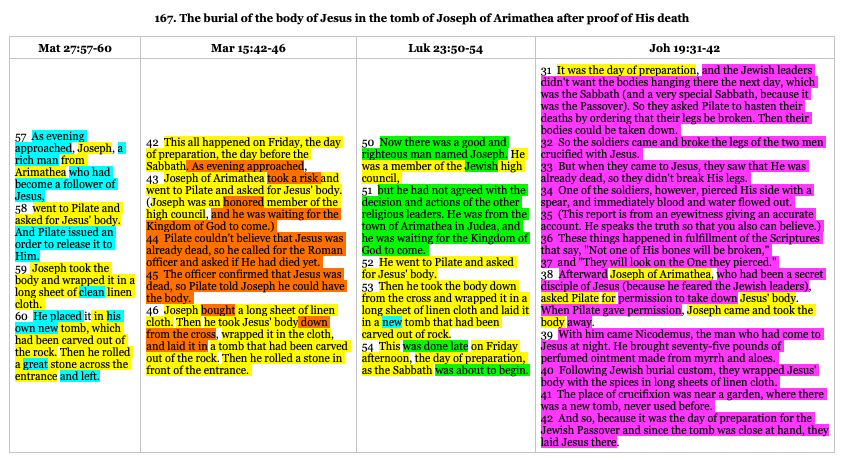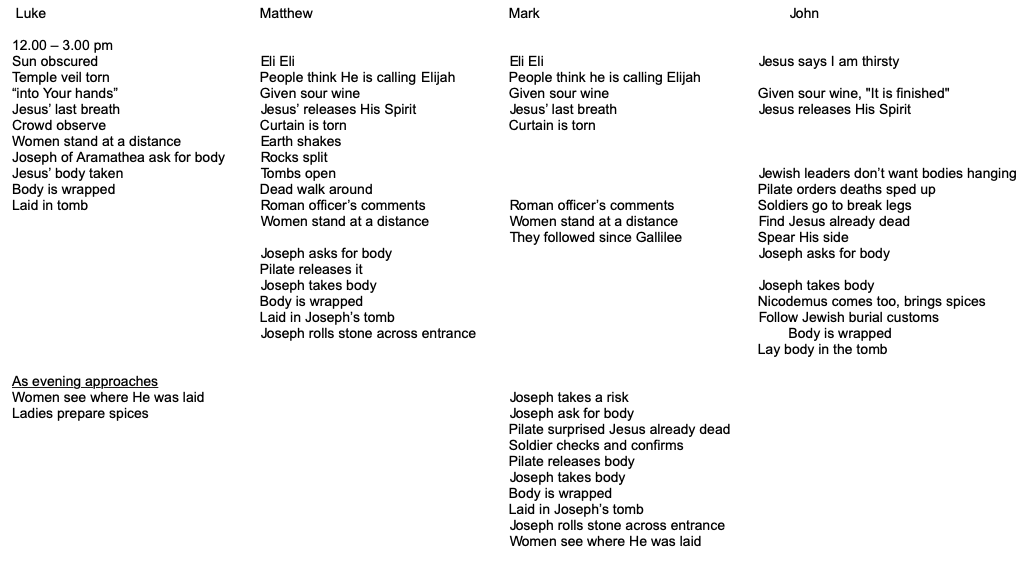It was now about the sixth hour, and darkness fell over the whole land until the ninth hour, because the sun was obscured; and the veil of the temple was torn in two. And Jesus, crying out with a loud voice, said, “Father, INTO YOUR HANDS I COMMIT MY SPIRIT.” Having said this, He breathed His last. Now when the centurion saw what had happened, he began praising God, saying, “Certainly this man was innocent.” And all the crowds who came together for this spectacle, when they observed what had happened, began to return, beating their breasts. And all His acquaintances and the women who accompanied Him from Galilee were standing at a distance, seeing these things. And a man named Joseph, who was a member of the Council, a good and righteous man (he had not consented to their plan and action),a manfrom Arimathea, a city of the Jews, who was waiting for the kingdom of God; this man went to Pilate and asked for the body of Jesus. And he took it down and wrapped it in a linen cloth, and laid Him in a tomb cut into the rock, where no one had ever lain. It was the preparation day, and the Sabbath was about to begin. Now the women who had come with Him out of Galilee followed, and saw the tomb and how His body was laid. Then they returned and prepared spices and perfumes. And on the Sabbath they rested according to the commandment.
Luke 23:44-56
- Shared
- Uniquely Matthew
- Uniquely Mark
- Uniquely Luke
- Uniquely John
I have kept the list of topics intact for this Gem as well. I figure it might be useful for you to have available as we work our way through this chunk of the story. There are a number of things which strike me from the big picture point of view at first and then there are many questions that come to my mind on the details of each segment. There are some macro level elements that struck me. It is interesting that Luke leaves out a lot of the macro level things that happen which Matthew in particular records. It seemed to me that Luke would be more likely to record the bigger picture issues like the earthquake, rocks splitting, graves opening and the dead walking around. But he chose not to do so. I am sure that it is not that he was unaware of those parts of the story. I am sure in his extensive research he came across those details. Yet he chose not to include them. John too records some other elements of the story which the synoptic writers don’t. Between them of course we have the full version. A good exercise for you to do would be to attempt to assemble the story in its chronological order as to the timing of when things happened.
Notice also that Luke records the fact that the tearing of the curtain took place before the death of Jesus where as the other two synoptic writers (Matthew and Mark) put the events in the reverse order. They record the death first and then the rending of the temple curtain. Interesting. Is there significance to the differences there? Notice also Luke’s overall thrust seems focused on the speed and peacefulness of Jesus passing and its ensuing effect on those who witnessed it. What is more interesting is that what follows from all writers is then stacked with the part the witnesses played in these events. But Luke’s record of this is very different from that of the other writers. You will notice there are also other little touches through Luke’s material which add details that are different from the other accounts. We are left with one major question in this regard: where does Luke get his unique information from?
Apart from the matters related to Luke’s unique details there is another overarching question covering all of these accounts and that is related to the matter of time and timing. The third hour, the sixth hour and the ninth hour are used to tag the time frames. What are meant by these terms? Not only that but Mark seems to record for us that the release of the body and the embalming and laying in the tomb took place as evening approached which doesn’t seem to match the 12.00 to 3.00 pm time frame. Furthermore Luke’s inclusion of the women at the end of his account appears to substantiate the fact that it was already late in the day and close to the time when the Sabbath began. Add to that the seeming discrepancies between the accounts as recorded in Mark 15:25, it being the third hour when they crucified Jesus, the sixth hour when Pilate handed down the sentence (John 19:14), and the references above to the sixth hour (12.00) being when darkness fell over the land till the ninth hour (3.00 pm). How do we reconcile all of these elements?
Here are some other questions to ask yourself:
- What was the nature of the darkness?
- Was it a solar eclipse?
- What other natural phenomena could explain what happened?
- What does Luke mean by “the light from the sun was gone”?
- What is the meaning of “land”? Does this mean Earth, Israel or the local area around Jerusalem?
- Can it be substantiated by sources outside of the Bible that this really happened?
- What happened to the veil to tear it like that?
- What was the veil that was torn?
- Is there any significance to Matthew’s comment that the veil was torn from top to bottom?
- Is there any connection between the tearing of the veil and Jesus dying precisely at that moment?
- What about what Jesus said, “It is finished?” What was finished?
- What about the differences between the records of what Jesus said and when? They don’t seem to match.
- Why are the segments divided between a) Jesus death b) the signs accompanying His death c) the burial?
- Why are there so many details that are different between the gospels?
I think that’s enough questions for the moment. And they are only the first level of questions we could or should ask more about the first segment.
Do you have any more significant questions to add to my list?
The strongest people are not those who show strength in front of us but those who win battles we know nothing about.
Sidney Mohede
You can easily judge the character of a man by how he treats those who can do nothing for him.
James D. Miles
God never alters the robe of righteousness to fit the man. Rather He alters the man to fit the robe.
John Hagee
It is a wonderful thing to be a personal friend of the One who fashions the heart of every king.
John Piper





